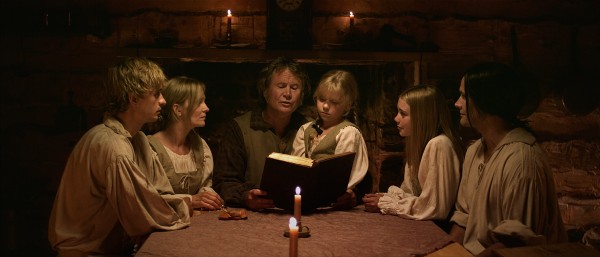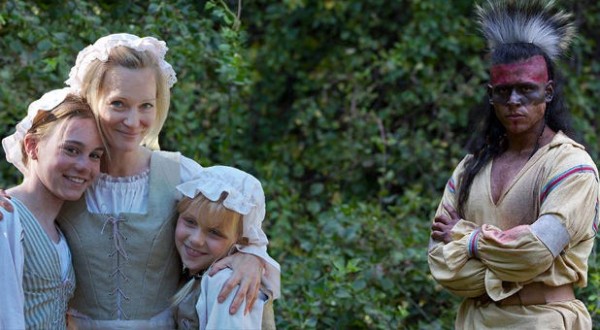Alone Yet Not Alone will probably go down in Oscar history as the most obscure Christian movie ever to have been given, and subsequently revoked, a nomination for best original song. In 2013, the movie run was limited to 11 actual theaters, five of them in Texas, according to the Alone Yet Not Alone website. One of the theaters listed on the website, Celebration! Cinema at Rivertown Crossings in Grand Rapids, Michigan, confirmed that the movie did play there briefly in September 2013. Additionally, the movie showed at the 2013 National Bible Bee in November
After considering the movie’s miniscule release and listening to the song itself, many speculated that the song’s nomination had less to do with its musical merits than it did the fact that the song’s composer, Bruce Broughton, is a former Governor of the Academy and the current Music Branch executive committee member.
Apparently, they were not wrong.
On January 28, the Academy’s Board of Governors rescinded the song’s Oscar nomination after discovering that Broughton contacted voters in a way that appeared to offer “an unfair advantage,” according to Academy President Cheryl Boone Isaacs. An Academy press release further explains the decision and the Academy’s promotional regulations.
There are now quite a few people who are upset that the song’s Oscar nod was snatched away, far more people than have ever seen the movie, by all appearances.
Their dismay is couched in language of triumph — along the lines of God’s opinion is the only thing that matters, so who cares about the Oscars anyway — and persecution. Some of these commenters, judging by the list of names I recognize personally, know nothing about the movie other than that it has a Christian message, and thus they’re interested in watching it whenever it actually comes out.
The thing is, even given its relative mediocrity, the song is better-quality than the movie itself, and is certainly, at least lyrically, less controversial in content.
The screenplay follows Tracy Leininger Craven’s book by the same name, a historical-fiction account of her ancestors, Barbara and Regina Leininger, German immigrants who were captured during the Penn’s Creek Massacre of 1755 and raised by Native Americans.
Given its tension and unusual nature, it could be quite suited to cinema, judging from this dated outline of events by John B. Deans. The climax of the tale comes in 1764, when Barbara and Regina’s mother is vainly searching among freed captives for the still-missing Regina, who has grown into adulthood and apparently forgotten her own name. Finally, Mrs. Leininger begins to sing one of Regina’s favorite hymns: Allein, und dock nicht ganz alleine, bin ich in meiner einsamkeit (Alone, yet not all alone, am I in my solitude). Regina recognizes the song, and runs forward into her mother’s arms.
The treatment this story receives by Tracy Leininger Craven is less than outstanding, however. The book is stilted and poorly written, with all the artistic and ideological subtlety of a Westboro Baptist picketing sign. As the story opens, the immigrant family is perfect, and perfectly happy to be toiling in this foreign land, which the book claims they have purchased from the Indians. They are so happy, in fact, that they would rather die and go to heaven in the contested woods of Pennsylvania circa 1755 than be “slaves” in Germany.

The males of the family do die in short order, trying to protect the females they have dragged to the promised land.
The screenplay is much like the book: full of historical inaccuracies (the native costumes come to mind), incoherent narrative and poor acting. After discussing the movie at length with other movie-goers, one source noted “superficial details were well-executed, but where it really counts, the core aspects of visual storytelling fell flat and was laden with faith-based platitudes. The cinematography was fairly well-executed — good framing and picture quality, although there were technical issues such as color grading. However, the script was very poor, moved slowly and lacked any sort of flow.” As far as more offensive underlying themes go, the story revolves around the idea that Native American culture was primitive, savage, and toxic to good Christian white girls, even when they were treated well by said Native Americans.
The lead role of Barbara Leininger went to Kelly Greyson, Tracy Leininger Craven’s older sister, although this familial link has been kept oddly hush-hush. Both women were homeschooled, which their father, billionaire right-wing political donor James Leininger, said was “consistent with his belief that parents should have choices in their children’s instruction.” Allegedly, James Leininger provided much of the funding for the movie and has been listed as its producer.
Owen, the movie’s male co-lead, was played by also-homeschooled modesty proponent Brett Harris, little brother of homeschooled Josh Harris, who first launched the idea of courtship into mainstream evangelical society.
The role of Colonel Mercer went to one-time patriarchal and homeschooling star Doug Phillips, although nearly all references to him appearing in the movie have been scrubbed since he admitted to having an “inappropriately romantic and affectionate” relationship with “a woman.” It remains to be seen if the version of the movie appearing in June 2014 will have excised his actual scenes as well. Two of his children are still listed in the IMDb credits, as well as former members of his church.
What all of the aforementioned cast members (with the possible exception of Kelly Greyson, who has not been vocal on the subject) have in common is a particularly strict view of gender and family. Homeschooling, to them, is a way to ensure that children believe all the right things and behave in all the right ways. To quote my cousins, who have been very active in this particular homeschooling community, part of this is the imperative that women be modest “keepers at home” (unless, perhaps, like Greyson, they are well-connected) whose pursuits revolve around serving their fathers or husbands.
All of these people believe that America would be better off under a theocracy of their choosing, and they think this is attainable with enough homeschool graduates, who will eventually win over the culture with their grand artistic and political productions — and their sheer reproductive numbers.
What they don’t appear to have realized yet is that all the illegally-campaigned Oscar nominations in the world won’t make their vanity projects into decent art. For art, you need to push, to explore, to touch the stillness and the complexity of what it means to be human; to echo the age-old, conflicted call towards the divine. Christians can make complex art with a good moral message, there is no question. Ask Dostoyevsky or Tolstoy.
However, bloated propaganda pieces are something else entirely.
 Katie Botkin is a freelance writer and the managing editor of MultiLingual magazine. She was homeschooled for the first 18 years of her life, and by age 26 had gone on to get two bachelors and a masters degree between teaching English on three continents.
Katie Botkin is a freelance writer and the managing editor of MultiLingual magazine. She was homeschooled for the first 18 years of her life, and by age 26 had gone on to get two bachelors and a masters degree between teaching English on three continents.














